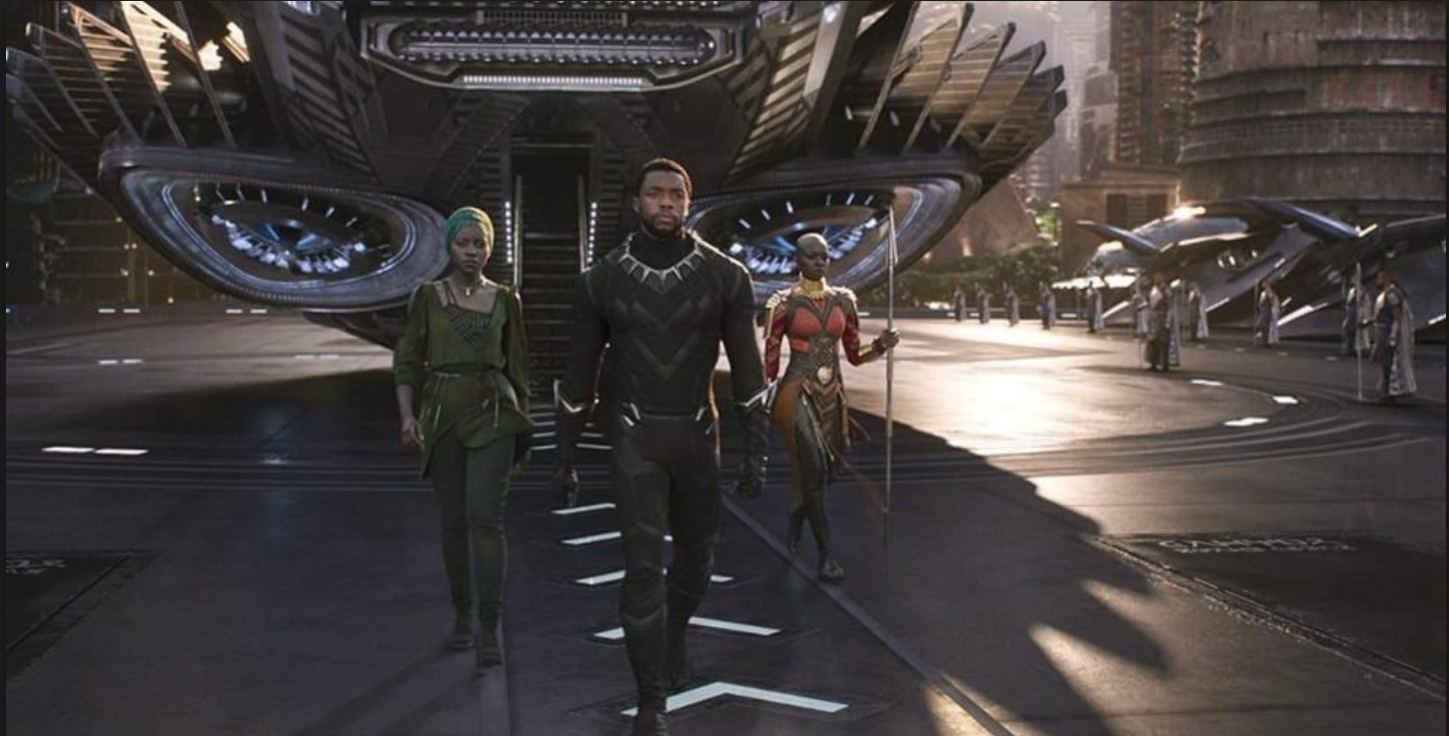chevron_left
-
play_arrow
NGradio So good... like you
A $426.6 Million Opening Makes ‘Black Panther’ The Top-Grossing Film With A Black Cast

share
close
Marvel Studios’ Black Panther bounded to success at the President’s Day box office, notching $242 million domestically over the four-day weekend–the second-highest such opening behind only Star Wars: The Force Awakens, and the biggest ever debut for a black director. In a triumph that could impact onscreen representation, its $184.6 million overseas total disproves a long-held industry myth that films with black casts underperform overseas.
The Ryan Coogler-directed action flick beat expectations to score the fifth biggest North American debut of all time. Even with an eye watering $200 million production budget and an estimated $150 million more spent on publicity, the tentpole it set to recoup its costs.
Black Panther follows T’Challa/Black Panther (Chadwick Boseman) as he is crowned king of Wakanda, a technologically advanced nation in Africa rich in the valuable metal vibranium. Alongside a cast including Lupita Nyong’o, Daniel Kaluuya and Forest Whitaker, he must protect the throne from an outside challenger: the Oakland, California-raised Erik Killmonger (Michael B. Jordan).
The comic book adaptation has already become the top-grossing film with a predominantly black cast. It outperformed hits from yesteryear such as Martin Lawrence and Will Smith’s Bad Boys series and Eddie Murphy’s Coming to America, the latter of which grossed $288.8 million in 1988.
Given that North American theater attendance dipped 6% in 2017, international markets have become ever more important. But movies with black casts have long struggled with the lore that they don’t perform well overseas. Take 2015’s Straight Outta Compton, which notched just 20% of its $201.6 million gross internationally, or Get Out, which scored less than a third of its $176 million worldwide gross overseas.
Black Panther destroys that assumption: Its $184.6 million overseas tally already accounts for 43% of its total gross, putting its international performance on track with other Marvel movies which can often double their domestic take overseas.
“Audiences deserve to see themselves reflected on the big screen,” Disney distribution chief Dave Hollis told the Hollywood Reporter. “Beyond being the right thing to do, it makes for richer storytelling.”
In recent years, movements such as #OscarsSoWhite have drawn attention to the lack of representation onscreen. Black characters comprised just 13.6% of characters of the top-grossing films in 2016, while white characters accounted for 70.8% of characters, according to a 2017 study by USC Annenberg’s Media, Diversity & Social Change initiative. That inequity was mirrored behind camera, too, where black directors made up just 5.6% of helmers. But far more black characters were found onscreen in movies with a black director than when a non-black director was in the seat.
Studios have begun taking steps to balance projects on both sides of the camera–and it’s boosting bottom lines. Last year, Warner Bros.’ female fronted and helmed Wonder Woman grossed $821.8 million worldwide on a $149 million budget, while Universal’s Girls Trip, with four black stars and a black director, managed $140 million on a $19 million budget.
Disney has been leading the charge. Beyond Black Panther, it signed up Ava DuVernay to direct the forthcoming A Wrinkle in Time, starring Oprah Winfrey, Reese Witherspoon, Michael Peña and Mindy Kaling. Its 2017 cartoon offering, Coco, explored the Mexican holiday of the Day of the Dead as voiced by Latino actors.
“The world has embraced Black Panther, which has obliterated expectations, broken records and shattered myths,” tweeted Disney CEO and chairman Bob Iger.
Disney bought Marvel for $4 billion in 2009, nabbing its character universe–which includes the Hulk, Thor, Captain America and now Black Panther–that make Marvel’s Cinematic Universe the highest-grossing franchise of all time.
Working within the framework of a superhero action movie, Black Panther focuses exclusively on black, African and African-American identities. The few white characters onscreen are not fleshed out and serve as little more than foils to the black protagonists–a refreshing reversal from Hollywood tropes that tokenize black characters, such as the black best friend.
In the U.S., Black Panther‘s diverse cast was reflected in its audience. Some 37% of moviegoers were African-American, per ComsCore, compared to just 15% on usual superhero movies, reflecting a pent-up demand for a black superhero. Women also turned out in droves, accounting for 45% of all ticket buyers.
As the movie continues its international rollout, Disney will be hoping that for theater goers, it’s Wakanda forever.
Send me a secure tip at forbes.com/tips and follow me on Twitter.
Source: forbes.com
Written by: New Generation Radio
Rate it
Similar posts
ΔΗΜΟΦΙΛΗ ΑΡΘΡΑ
COPYRIGHT 2020. NGRADIO




















Post comments (0)